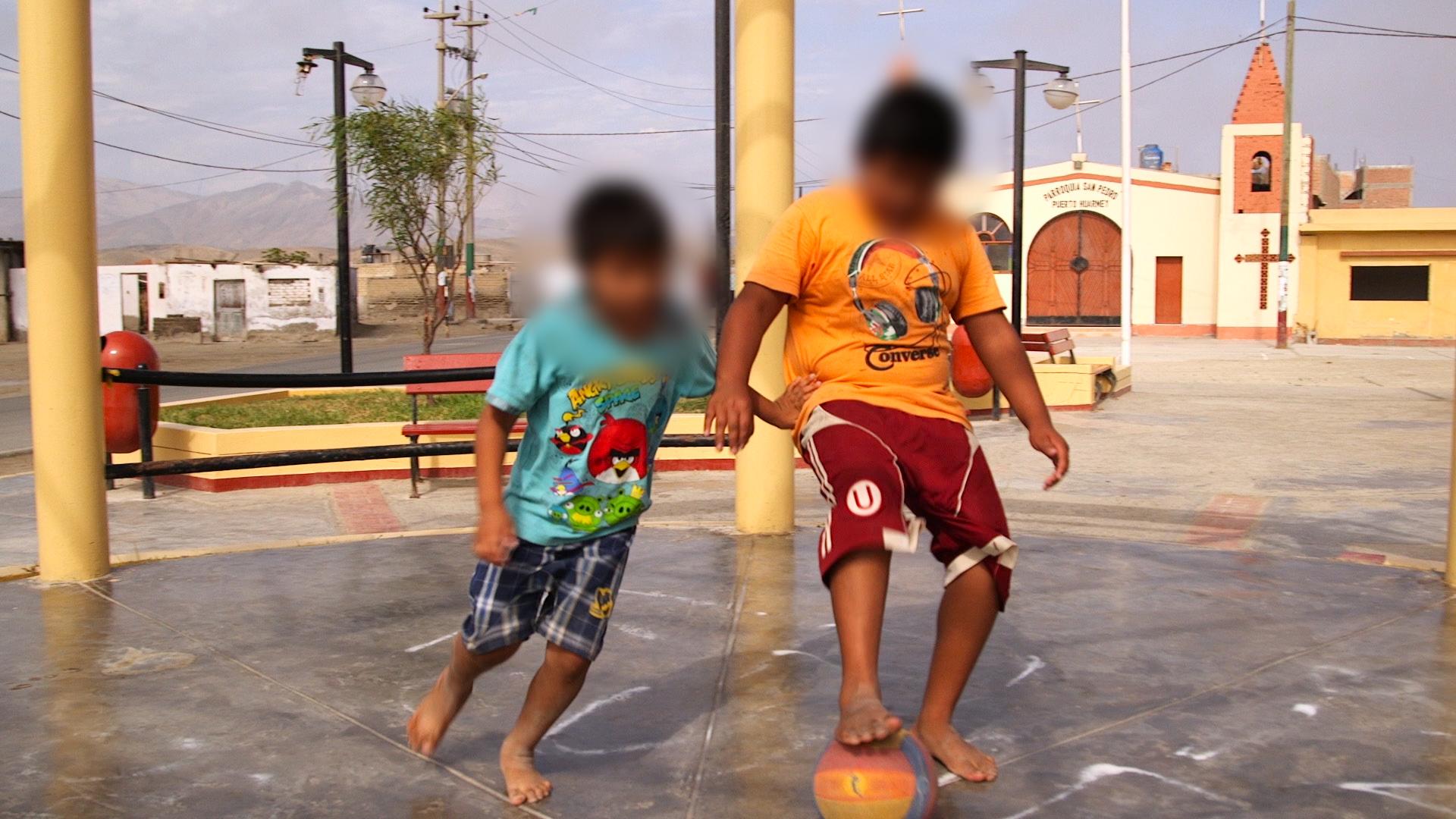US priests accused of sex abuse get a second chance by relocating to South America
Children play soccer in front of the church where Father Paul Madden celebrates Mass, in the tiny, scruffy fishing village of Puerto Huarmey, Peru. Father Madden admitted to molesting a 13-year-old boy, and told GlobalPost he could never again work in the US.
RIO DE JANEIRO, Brazil — The Catholic Church has allowed priests accused of sexually abusing children in the United States and Europe to relocate to poor parishes in South America, a yearlong GlobalPost investigation has found.
Reporters confronted five accused priests in as many countries: Paraguay, Ecuador, Colombia, Brazil and Peru. One priest who relocated to a poor parish in Peru admitted on camera to molesting a 13-year-old boy while working in the Jackson, Mississippi diocese. Another is currently under investigation in Brazil after allegations arose that he abused disadvantaged children living in an orphanage he founded there.
All five were able to continue working as priests, despite criminal investigations or cash payouts to alleged victims. All enjoyed the privilege, respect and unfettered access to young people that comes with being clergy members.
In the US, Catholic leaders have come under intense pressure for concealing priests’ sex crimes, and for transferring perpetrators among parishes rather than turning them over to law enforcement. The scandal has cost the church billions of dollars and led to a sharp decline in new clergy.
In response, in 2002 US bishops approved a “zero-tolerance” policy, under which priests who molest children are no longer allowed a second chance to serve in the clergy.
Victim advocates say that relocating priests to poorer parishes overseas is the church’s latest strategy for protecting its reputation.
“As developed countries find it tougher to keep predator priests on the job, bishops are increasingly moving them to the developing world where there’s less vigorous law enforcement, less independent media and a greater power differential between priests and parishioners,” said David Clohessy, spokesman for the Survivors Network of those Abused by Priests, or SNAP. “This is massive, and my suspicion is that it’s becoming more and more pronounced.”
The priests GlobalPost confronted on camera, far from the US and European churches where the sexual abuse allegations occurred, include:
- Father Carlos Urrutigoity, accused of sharing beds with and fondling teenage boys in Scranton, Pennsylvania. The bishop of Scranton called him a “serious threat to young people,” but in Paraguay, reporters found him leading Mass in a major church. He had been promoted to second-in-command of the diocese of Ciudad del Este.
- Father Francisco “Fredy” Montero, accused of abusing a 4-year-old girl in Minneapolis, Minnesota. He relocated to his native Ecuador, where he was placed in a succession of remote parishes — despite a dossier sent by the Archdiocese of Minneapolis to his new diocese, warning of Montero’s past.
- Father Paul Madden, who admitted molesting a 13-year-old boy on a mission trip when he was stationed in Jackson, Mississippi. The diocese paid the victim’s family $50,000 and Madden moved to the diocese of Chimbote, Peru, where he still celebrates Mass each week.
- Father Jan Van Dael, accused of molesting several young men in his native Belgium before moving to northeastern Brazil, where he started an orphanage for street kids. Van Dael is under investigation by Belgian and Brazilian authorities after accusations of abuse arose in Brazil, too.
Another priest we tracked down, Father Federico Fernandez Baeza, was indicted by a grand jury in 1987 on two second-degree felony charges of indecency with a child.
A family in San Antonio, Texas accused Fernandez in a civil lawsuit of ritually raping two brothers over a two-year period. Prosecutors dropped the criminal case after the diocese of San Antonio reportedly paid the family more than $1 million. Fernandez flew to Colombia, where he continued a high-profile career in the church. We traced him to the city of Cartagena, where he’s a senior administrator and priest at a Catholic university.
After consulting with Fernandez’s office, university guards prohibited us from entering the campus, and Fernandez has not responded to requests for comment.
The priests told us they have been allowed to continue preaching unfettered, without facing internal investigations, despite Pope Francis’ pledges to clean up the church.
Last year, the pope sent a letter to every bishop in the world, ordering them to follow a global “zero tolerance policy” on child abuse. This year he created a commission tasked specifically with protecting children from church sex abuse.
Following repeated phone calls and emails, both the Vatican’s press office and the head of the commission, Cardinal Sean Patrick O’Malley, declined to provide comment for this story.
The cases GlobalPost found are exactly what the church and Cardinal O’Malley’s commission need to be focusing on, said Peter Saunders, an advocate for abuse survivors and a lay member of the church’s commission.
“Zero tolerance is meaningless unless it applies to the whole institution,” he said. “Arguably, some of the biggest problems are in the less well-off parts of the world, South America, Africa, the Far East. This is where we know many priests flee to in order to carry on their abuse, which is an absolute outrage.”
View the full investigation here.
Editor’s note: Due to an editing error, a previous version of this story suggested that the church reportedly paid settlement money to the prosecutors. The settlement went to the family of the victims.
We want to hear your feedback so we can keep improving our website, theworld.org. Please fill out this quick survey and let us know your thoughts (your answers will be anonymous). Thanks for your time!
